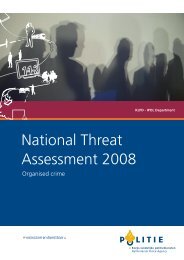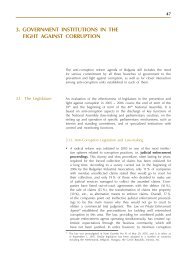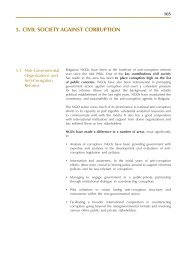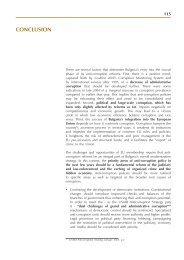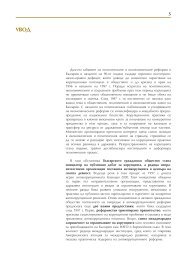Assessing the Effectiveness of Organized Crime Control Strategies ...
Assessing the Effectiveness of Organized Crime Control Strategies ...
Assessing the Effectiveness of Organized Crime Control Strategies ...
You also want an ePaper? Increase the reach of your titles
YUMPU automatically turns print PDFs into web optimized ePapers that Google loves.
1.0 Introduction<br />
O<br />
ver <strong>the</strong> past three decades, organized crime (OC) has been <strong>the</strong> subject <strong>of</strong> numerous<br />
legislative initiatives and scholarly studies around <strong>the</strong> globe. In Canada, legislation in this<br />
area has intensified in recent years in an effort to provide law enforcement with <strong>the</strong> tools to<br />
investigate criminal organizations and to o<strong>the</strong>rwise aid in <strong>the</strong> fight against OC. Specifically,<br />
since 1997, <strong>the</strong> Canadian Parliament has passed legislation providing for such things as enhanced<br />
police powers, <strong>the</strong> creation <strong>of</strong> an agency to combat money laundering (Bill C-22), and <strong>the</strong><br />
creation <strong>of</strong> a new criminal organization <strong>of</strong>fence (Bill C-95).<br />
In 2001, Bill C-24 was introduced. This Act creates new <strong>of</strong>fences (e.g., commission <strong>of</strong> an<br />
<strong>of</strong>fence for a criminal organization) and broadens <strong>the</strong> powers <strong>of</strong> law enforcement to seize<br />
property used in crime and, ultimately, to initiate proceedings leading to <strong>the</strong> forfeiture <strong>of</strong> <strong>the</strong><br />
assets <strong>of</strong> criminal organizations.<br />
At several meetings over <strong>the</strong> last five years, Federal/Provincial/Territorial Ministers responsible<br />
for Justice have reaffirmed <strong>the</strong> importance <strong>of</strong> combating OC. They have stressed <strong>the</strong> need to:<br />
• develop OC prevention strategies;<br />
• keep legislation and regulations up to date;<br />
• co-ordinate national and regional initiatives;<br />
• undertake research and analysis; and,<br />
• engage in public education.<br />
The Ministers also identified a series <strong>of</strong> national policy priorities, such as drug trafficking,<br />
economic crimes, high-tech crimes, money laundering, illegal immigration and trafficking <strong>of</strong><br />
humans, and corruption.<br />
The overall aim <strong>of</strong> this report is to support legislative reform and policy development in relation<br />
to OC. More specifically, <strong>the</strong> report will provide new information to <strong>the</strong> Department <strong>of</strong> Justice,<br />
fur<strong>the</strong>r inform ongoing research activities, and help support <strong>the</strong> planned mid-term and<br />
summative evaluations <strong>of</strong> <strong>the</strong> Measures to Combat <strong>Organized</strong> <strong>Crime</strong> initiative. The planned<br />
evaluations by <strong>the</strong> Department are part <strong>of</strong> a larger coordinated interdepartmental review <strong>of</strong> <strong>the</strong><br />
initiative, which includes <strong>the</strong> Department <strong>of</strong> <strong>the</strong> Solicitor General Canada, Royal Canadian<br />
Mounted Police, and Correctional Services Canada. The results <strong>of</strong> this project may also be used<br />
to inform <strong>the</strong> public about <strong>the</strong> issue.<br />
Specifically, <strong>the</strong> overriding purpose <strong>of</strong> this project is to review studies that have assessed <strong>the</strong><br />
effectiveness <strong>of</strong> OC control strategies. These strategies may be legislative, police, or<br />
community-based. The review has sought to be inclusive, covering analyses using a broad range<br />
<strong>of</strong> research methods and data sources. The review includes studies by academics, criminal<br />
justice system personnel, government, and law enforcement agencies. While <strong>the</strong> focus <strong>of</strong> this<br />
review is on studies conducted in Canada, <strong>the</strong> United States, and o<strong>the</strong>r western countries, salient<br />
material from o<strong>the</strong>r jurisdictions has been included.<br />
Research and Statistics Division / Department <strong>of</strong> Justice Canada | 1



